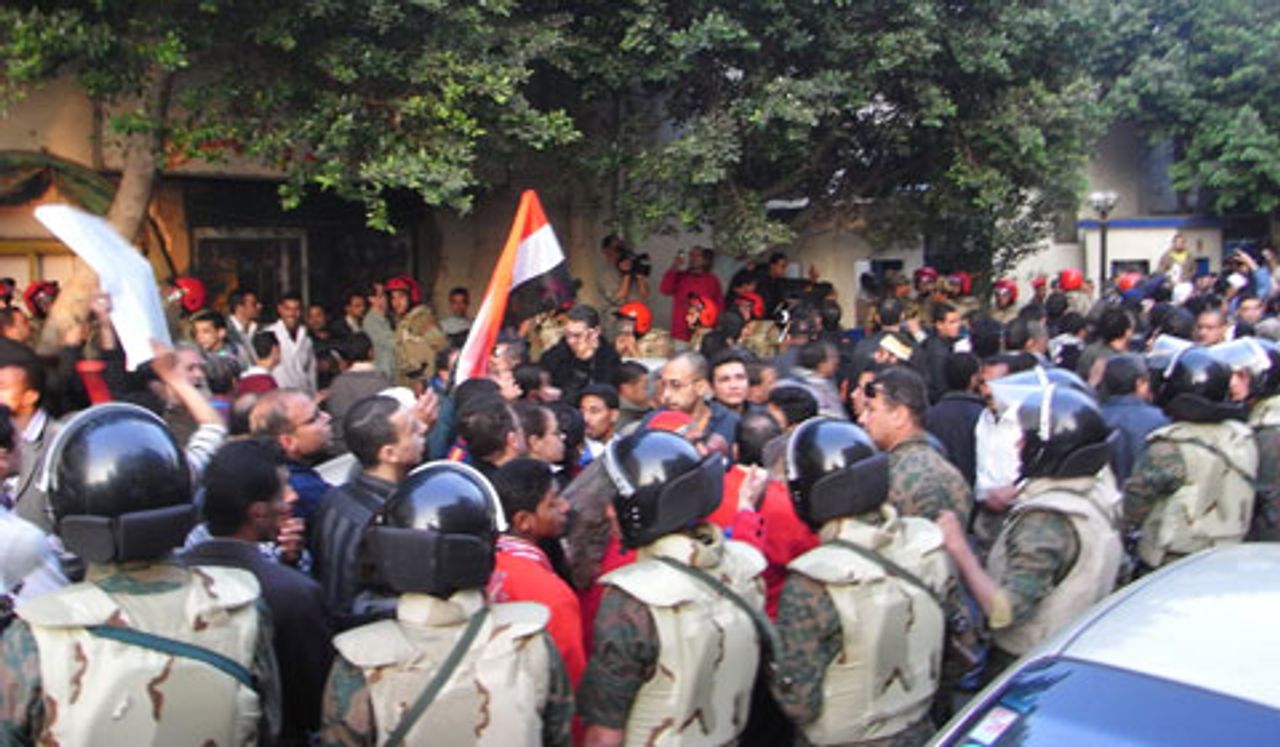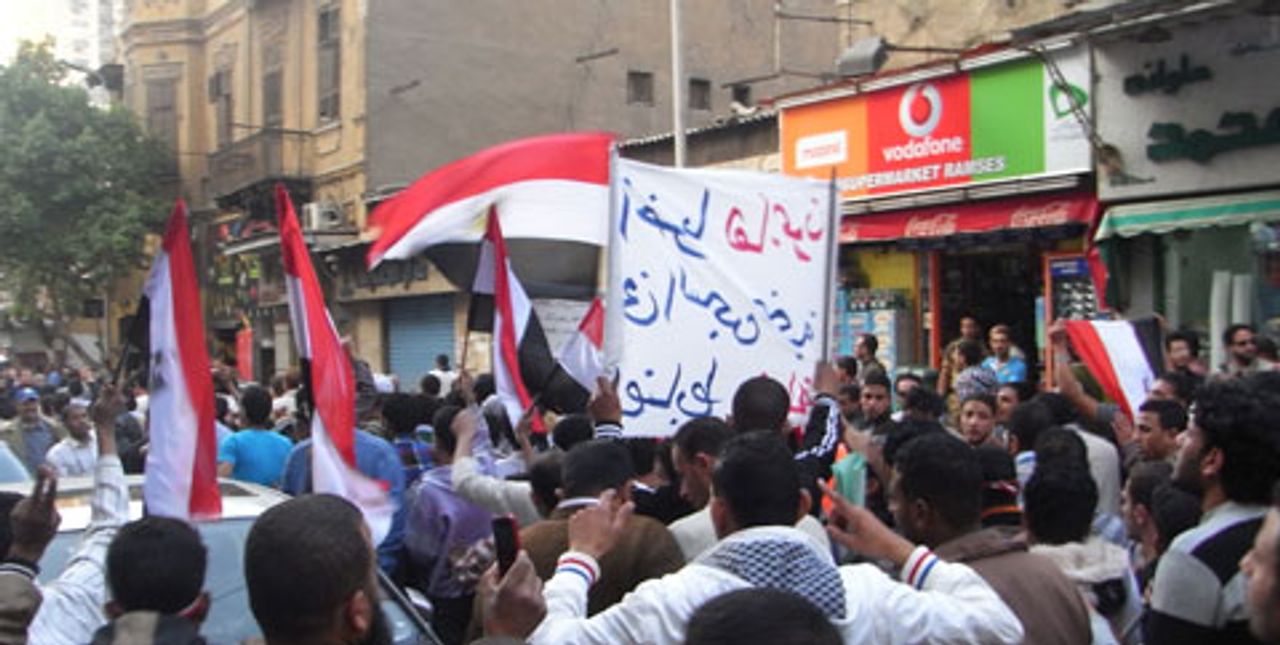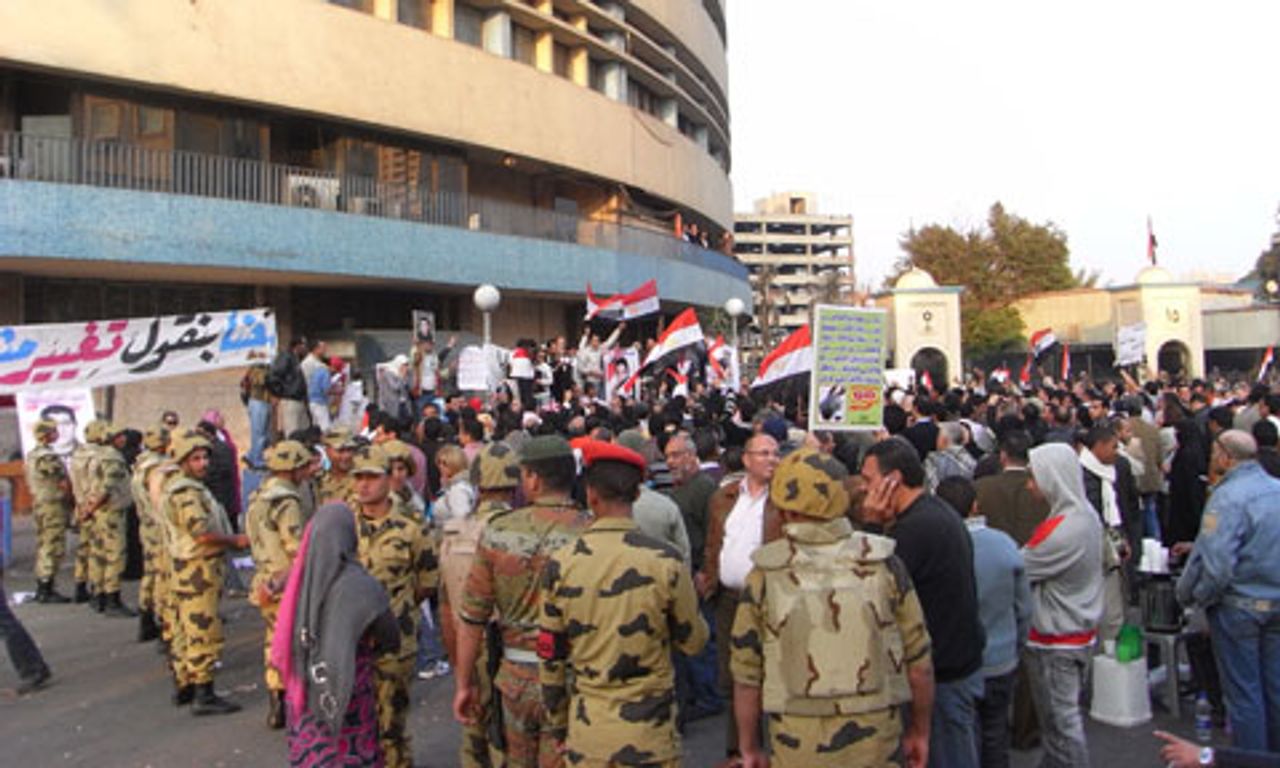 Strong military presence
Strong military presenceOn Friday, thousands took to the streets of Cairo to demonstrate for the demands of the revolution and against the US-backed counter-revolution in Egypt. The military-installed regime of Prime Minister Essam Sharaf passed a law on Wednesday banning all protests and demonstrations, and punishes violations against the legislation with draconian penalties.
The law states that all protests or strikes that disrupt the economy or hamper the work of state institutions, public authorities or private or public sector enterprises are to be punished with prison sentences of one year and fines from 100,000 to 500,000 Egyptian pounds.
The law is an open challenge to the revolutionary workers and youth of Egypt. It prohibits strikes and protests with exactly the same methods that drove the population to overthrow the previous dictator, Hosni Mubarak. The law will apply as long as the new state power continues to enforce the emergency laws, used by the Mubarak regime to suppress the country since 1981. A key demand of the revolution was the abolition of the emergency laws, but the military and Sharaf are now heading in exactly the opposite direction.
It is clearer than ever that the military and Sharaf represent the class interests of the ruling elite, rather than those of the revolution. They are prepared to suppress protests and strikes just as brutally as did the fallen dictator, Mubarak. The law was announced shortly after the Egyptian stock exchange resumed trading, since its suspension following the plummeting of the index by nearly 10 percent on January 27.
 Demonstration
DemonstrationThe attempt of the Egyptian bourgeoisie to stabilise the economy through the use of force and thereby reassure foreign investors has the full support of governments in Europe and the US. In recent weeks, scores of senior officials have travelled to Egypt to make sure that the new regime will defend Western imperialist interests just as firmly as the old one. It is no accident that the law was adopted on the same day that Defence Secretary Robert Gates visited Cairo. Many workers and youth, some of whom had illusions in the military after Mubarak’s ousting, are beginning to understand its counter-revolutionary role and are looking for political alternatives.
Ahmed, an unemployed journalist interviewed by the WSWS in Tahrir Square, said, “At least by the time Sharaf and the military moved to clear Tahrir Square, it was obvious they are controlled by the old forces. The military leadership, in particular, still stands for the old Mubarak dictatorship. I especially hate Tantawi. He’s an old friend of Mubarak and a close ally of the US”.
Ahmed said that the hypocrisy of the US’s role in events knew no bounds: “Hillary Clinton now tears around Tahrir Square, exhorting the virtues of democracy! I remember very well the weapons and the tear gas ‘made in the US’ that were used against us”.
 Protesters in front of the state television building surrounded by military
Protesters in front of the state television building surrounded by militaryObama supported Mubarak to the end and is now attacking Libya in the name of human rights. A friend of Ahmed—who founded a Facebook group, for which both distributed flyers to spread the group’s demands—also pointed to the counter-revolutionary role of the military, and reported that the military had beaten up peaceful students at Cairo University on Wednesday.
Both emphasise that they will not stop their protests until their demands—such as the arrest of Mubarak and other corrupt ministers, full freedom of expression for people and the press, and the abolition of Mubarak’s National Democratic Party—are implemented. They are sure that the new law will not be accepted under any circumstances, and that demonstrations will continue.
On the day of the interview, many hundreds were demonstrating in Tahrir Square, chanting their demands and discussing the new political situation. There were fewer people there than on previous Fridays, but the mood among the protesters in the square was undaunted. “We are not afraid, we will come back to Tahrir”, they chanted, or called out to the military government, “Take your orders from Tahrir Square”.
Around 4 p.m., a protest march prepared to move off from Tahrir to the state television building in Maspero. Hundreds were already demonstrating there against the new law and for the dismissal of corrupt journalists, who had been spreading the lies of the Mubarak regime. During the march, a woman protester said they were still faced with the same criminals that prevailed in Mubarak’s time. “It’s true that Mubarak’s gone, but the system remains. The new Mubaraks are now called Sharaf and Tantawi”, she said.
The growing mistrust of the masses for the military is especially expressed in the rejection of Field Marshal Mohammed Tantawi, who has ruled the country with dictatorial powers as chairman of the army’s supreme council since Mubarak’s overthrow. Although a chanting for unity between protesters and the army was dominant at the beginning of the revolution, one now hears slogans levelled directly against the army leadership. “The people demand the overthrow of the field marshal” or “Tantawi, go away, we don’t want you”, chanted protesters in front of the radio building.
Hassan, a young student, confirmed that many had had illusions in the military at first, but such illusions would die away after the events of recent weeks. “The military does not represent our interests. It represents the interests of the US, and it has done so since the time of Sadat, when Egypt once again subordinated itself to the US”, he said. He added that he thought more and more people would now understand this.
He thinks the new law is completely unacceptable. The placard he carried bore the inscription: “Striking is a legitimate right. Against poverty. Against hunger”. Hassan said that the plight of many poor and hungry people in Egypt had not changed in the slightest since the revolution. He said the new regime had indeed made many promises, but so far it had kept absolutely none. For example, a minimum wage of 1,200 pounds was promised, but people are still waiting for it. Then he paused and said, “Unless something changes soon, there will be a new revolution”.
